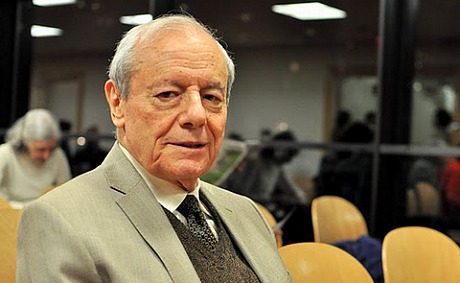In a piece about Roger Ebert in the wake of this death, the downshifted film and theatre critic John Simon wrote the following: “I firmly believe that the film critic should have a special expertise, like any kind of art critic. Like a physician, he should know more about medicine than a layman who picks an over-the-counter drug for a cold; like an architect, he should know more about architecture than a mere gaper at buildings.

John Simon
“The opinions of common men about film may be of genuine interest, but are of no major importance. To be sure, a failure in medicine is made manifest by the patient’s demise; a failure in architecture, by a collapsed building or a permanent eyesore. For failure in criticism, there is no such manifest evidence. Only time has the last word, but the good critic foreshadows it.”
It is part of 20th Century New York legend that Simon’s critiques were often colored by elitist attitudes and an inclination toward negative assessment, but Simon, for me, has always been an elegant wordsmith. You can always count on an atmosphere of discipline and precision in a Simon piece. Those carefully phrased sentences and well-organized paragraphs. It’s been said that Simon was the Armond White of the ’60s, ’70s and ’80s, but he would have never heckled a recipient of a New York Film Critics Circle award, as White did last night. Now 88, Simon is a dapper, old-school gentleman of Hungarian descent.
And yet last April Simon used the term “common men.” That dates him, I’m afraid. Joe Blow/Joe Popcorn/Joe Sixpack/Joe Meathead will always be a fixture in the American social evolution. If anything the proverbial thick-fingered vulgarian is more manifest today than ever before. But over the last 15 years “the opinions of common men” have become a matter of “major importance” via the online dialogue. They are, in fact, almost the entire ballgame these days with film critics and columnists occupying only a fringe position and doing two things and two things only — (a) kick-starting the online conversations and in some ways pushing them along or fanning the flames (as I try to do from time to time), and (b) supplying passion and conviction when award season kicks in.
I can certainly say that apart from Serious Movie Catholics, who can be found among any age group, the under-30 generation barely pays attention to traditional film critics. If anything they glance at the critical-opinion aggregate sites but that’s as far as it goes, and that’s not typical — most under-30s just watch trailers and consult Twitter and go from there.
This is nothing new, of course. I was just struck that a guy like Simon, who was always a pretty sharp bird, would be of the opinion in this day and age that views of a critical elite would carry any weight at all with the hoi polloi. The question is to what extent, if any, do the hoi polloi even take notice of (much less read) the critical elite? Good people like Joe Morgenstern, Stephanie Zacharek, Katey Rich, Peter Howell, Guy Lodge and Glenn Kenny probably don’t want to know the answer.












